| Srl | Item |
| 1 |
ID:
083529
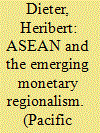

|
|
|
|
|
| Publication |
2008.
|
| Summary/Abstract |
Monetary regionalism - along with bilateral trade agreements - is receiving significant attention in Asia. This article analyzes its development since 2000 with specific reference to the role of ASEAN. It discusses the general rationale for monetary and financial cooperation, the Chiang Mai process, the rivalry between China and Japan, the potential exchange rate regime for the region including monitoring and surveillance, the evolution of regional bond markets, as well as the institutional dimension of monetary regionalism. The analysis confirms that monetary regionalism in Asia will be a complex endeavor and will - if at all - only be achieved in the long run. ASEAN will be able to function as a catalyst for monetary regionalism, but China and Japan are the more important players. Without their (joint) effort, ASEAN will not be able to achieve significant change in monetary and financial affairs.
|
|
|
|
|
|
|
|
|
|
|
|
|
|
|
|
| 2 |
ID:
087562
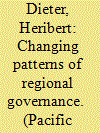

|
|
|
|
|
| Publication |
2009.
|
| Summary/Abstract |
For decades, international relations in the Asia-Pacific were characterized by an emphasis on security affairs. Following the Asian financial crisis of 1997/98, this pattern has changed. In the early 21st century, policy makers in the region put emphasis on the deepening of economic relations. Both in trade and finance, new patterns of governance have emerged. The reasons are manifold. First, traditional security threats are not as important as they used to be. Second, the experience of 1997/98 as well as the current crisis have demonstrated that economic instability is of greater concern than security threats. Third, the economies of the Asia-Pacific are deepening their ties both at the level of production and with regard to investment flows. Despite these structural changes, the level of cooperation continues to be relatively low.
|
|
|
|
|
|
|
|
|
|
|
|
|
|
|
|
| 3 |
ID:
074948
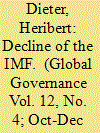

|
|
|
| 4 |
ID:
173150
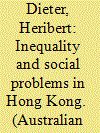

|
|
|
|
|
| Summary/Abstract |
Many young people in Hong Kong, supported by a large number of middle-aged citizens, are fighting the government in order to preserve Hong Kong’s liberty and relative autonomy from Beijing. However, the question still is why people in Hong Kong are so rebellious, whilst people in comparable Asian societies are not. But differently: Why do Hong Kong citizens continue to fight the regime despite their quite unexpected victory, the withdrawal of the extradition bill? Why do well-to-do bankers, lawyers and office clerks support a movement that is increasingly using violence to support their demands? The full understanding of the situation in Hong Kong requires to view the fight for political freedom in relation to other, deeper socio-economic factors.
|
|
|
|
|
|
|
|
|
|
|
|
|
|
|
|
| 5 |
ID:
090428
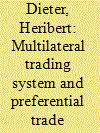

|
|
|
|
|
| Publication |
2009.
|
| Summary/Abstract |
Preferential trade agreements pose a big challenge for the multilateral trading system. Throughout the first decade of the twenty-first century, their number has grown significantly. However, these agreements have a range of disadvantages compared with the multilateral regime, for example, in trade facilitation and in dispute settlement. Whereas it will be difficult to stop the further spreading of this wave of preferential agreements, attempts can be made to reduce the negative effects of trade agreements that do, by definition, discriminate against other countries. In this article, a range of potential remedies are discussed, from a moratorium to the better enforcement of World Trade Organization rules on preferential agreements as well as improved monitoring.
|
|
|
|
|
|
|
|
|
|
|
|
|
|
|
|
| 6 |
ID:
123253
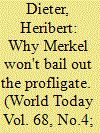

|
|
|